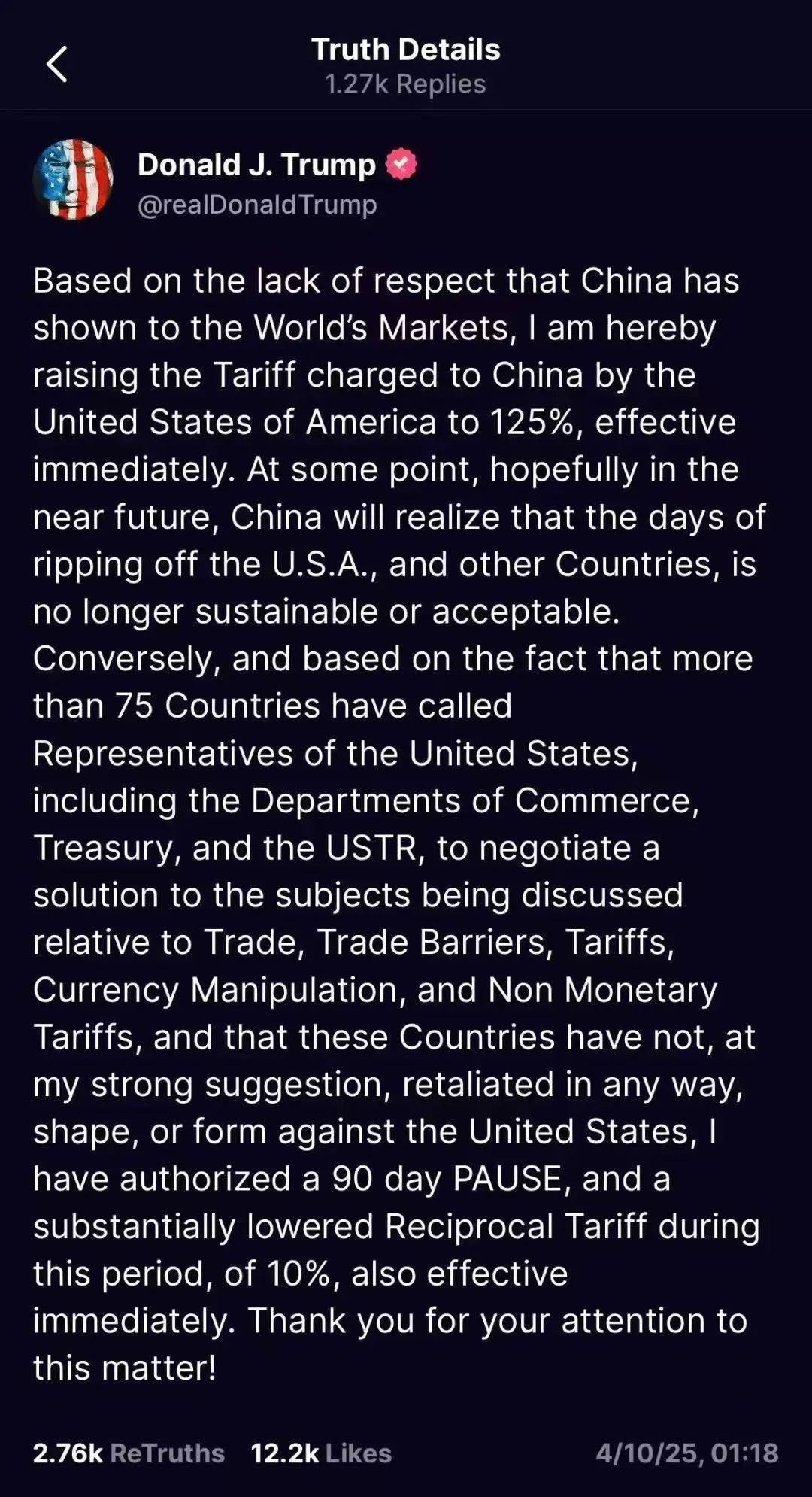Kategorien
- Unser Blog (57)
- Unsere Projekte (62)
- FAQ (6)
US -Lithium -Batterie -Importtarif Erhöhung:
EIN neues Energiespiel, das die Welt betrifft
An 10 April 2025, Der Präsident der Vereinigten Staaten, Donald Trump 125%, Sofort wirksam. Früher, Die US -Regierung hatte eine Erhöhung der „gegenseitigen Tarife“ bei chinesischen Exporten in die Vereinigten Staaten aus angekündigt 34% zu 84% , wirksam 9 April. Die chinesische Regierung reagierte umgehend mit der Ankündigung, wirksam 10 April 2025, Der Zollsatz für Einfuhren mit Ursprung in den Vereinigten Staaten würde erhöht 34% zu 84%.

* Der „heimliche Kampf“ hinter den Zöllen: Wofür kämpfen die Vereinigten Staaten??*
Die ursprüngliche Absicht der USA bestand darin, die Zölle weiter zu erhöhen Lithiumbatterien, direkt auf die beiden Kernziele hinweisen: „Industrieller Rückfluss“ und „Energiesicherheit“.
Ambitionen in der lokalen Fertigung: Im letzten Jahrzehnt, die Vereinigten Staaten haben nur dafür verantwortlich gemacht 6% der weltweiten Produktionskapazität für Lithiumbatterien, stark auf Importe angewiesen (China ist verantwortlich 75% der globalen Kapazität). Die Zollerhöhung soll Autokonzerne und Batteriehersteller dazu zwingen, ihre Produktionslinien in die USA zu verlagern, Den Weg des Chip Act in der Halbleiterindustrie wiederholen und die Fertigung wiederbeleben.
Ein Mikrokosmos geopolitischer Rivalität: Hinter der Politik stehen Bedenken hinsichtlich der Dominanz Chinas in der neuen Energiekette. Die USA versuchen, die Importabhängigkeit durch Zollschranken zu schwächen, während er seine Verbündeten drängt (z.B., Südkoreas LG, Japans Panasonic) den Bau von Fabriken in den USA zu beschleunigen und eine „entchinaisierte“ Lieferkette aufzubauen.
Kontroverser Punkt: Die Politik scheint lokale Unternehmen zu schützen, Aber den Vereinigten Staaten mangelt es kurzfristig an einer vollständigen Raffinierung von Lithiummaterialien und an Produktionskapazitäten für Batterien, Eine erzwungene „Entkopplung“ kann zu Versorgungsengpässen führen. Tesla-Chef Musk hat öffentlich hinterfragt, „Eine Erhöhung der Zölle ist, als würde man die Elektroautoindustrie bremsen.“
* Der „Schmetterlingseffekt“ der Industriekette: Wer profitiert? Wer wird verletzt??*
Kurzfristige Schmerzen: Elektrofahrzeugunternehmen verlassen sich auf importierte Batterien (z.B., Rivian, Klar) stehen vor steigenden Kosten, und könnte gezwungen sein, die Preise für einige Modelle zu erhöhen 5-10 Prozent, die Wettbewerbsfähigkeit des Marktes untergraben.
Langfristige Dividenden: durch die Politik angeregt, Chinesische Unternehmen wie CATL und Svolt verstärken ihre Zusammenarbeit mit Ford und Tesla beim Bau von Fabriken durch das Technologielizenzmodell; Die südkoreanischen Unternehmen SK On und Samsung SDI haben zusätzliche Investitionen in den USA angekündigt, und die lokale Produktionskapazität wird sich voraussichtlich verdreifachen 2030.
Preiserhöhungen bei Elektrofahrzeugen könnten die Marktdurchdringung verlangsamen und dem Ziel zuwiderlaufen 50% Verbreitung von Elektrofahrzeugen durch 2030. Aber wenn die lokale Lieferkette ausgereifter wird und die Kosten sinken, Langfristig gesehen gibt es noch Raum für Fantasie.
Emotionale Resonanz: Ein US-Nutzer twitterte in den sozialen Medien, „Die Regierung sagt immer: „Buy American“, Aber mein Portemonnaie kümmert sich nur darum, wann ich eins kaufen kann $30,000 bezahlbares Elektroauto.“
Chinesische Batterieunternehmen haben sich an Mexiko und Südostasien gewandt, um Fabriken zu bauen und Zölle durch das Abkommen zwischen den USA, Mexiko und Kanada zu vermeiden; während Europa die Gelegenheit genutzt hat, um Investitionen in Midstream-Materialien anzuziehen und die lokale Produktion zu stärken.
Eckdaten: In 2023, Chinas Lithiumbatterie Die Exporte stiegen um 87% gegenüber dem Jahr, aber der Anteil der Exporte in die Vereinigten Staaten ist zurückgegangen 35% zu 18%, und der Trend zur Risikoreduzierung in der Industriekette ist offensichtlich.
* Ter als nächstes 10 Jahre : Drei große Trends in der Lithiumbatterieindustrie*
Beschleunigte Technologiesubstitution: Solide Batterien, Natrium-Ionen-Batterien und andere neue Technologien können das bestehende Muster durchbrechen, Verringerung der Abhängigkeit von Lithiumressourcen, und somit die Wirkung von Zollhemmnissen abschwächen.
Regionalisierte Lieferketten nehmen Gestalt an: Die Welt wird ein „Triple-Pole-Modell China-USA-Europa“ bilden, und Autohersteller müssen in jeder Region lokalisierte Produktionskapazitäten aufbauen, um politische Risiken zu vermeiden.
Der Aufstieg der Kreislaufwirtschaft: UNS. örtliche Batterierecyclingunternehmen (wie Redwood Materials) werden von der politischen Ausrichtung profitieren, Die gebrauchte Batterie kann zu einer „städtischen Mine“ werden oder zu einem neuen Schlachtfeld werden.
* Abschluss: Jenseits des Spiels, Globale Zusammenarbeit ist erforderlich*
Der Kern des Zollstreits ist der Kampf der Länder um das Mitspracherecht im neuen Energiezeitalter. jedoch, Der Klimawandel kennt keine Grenzen, und Lithiumbatterien sind nicht nur eine Ware, sondern auch ein wichtiges Instrument zur Erreichung der CO2-Neutralität. Politische Entscheidungsträger müssen sich vor „Nullsummendenken“ hüten – wenn Handelshemmnisse die Klimaziele außer Kraft setzen dürfen, Die Menschheit zahlt möglicherweise einen höheren Preis. Für normale Leute, Der Ausgang dieses Spiels wird direkt darüber entscheiden, ob wir zu erschwinglichen Kosten eine sauberere Zukunft gestalten können.
Ende
*********************
Die Lyth -Batterie ist nicht nur ein Lieferant von Lithiumbatterienzellen, sondern auch ein Profi Hersteller von Lithium-Batteriemodulen und -Packs. Wir verwenden keine Batteriestypen für die Gradientenauslastung . Egal für einzelne Zellen, Batteriemodule oder Packungen, Lyth verwenden nur eine voll neue Zelltypen, die den ursprünglichen Testbericht enthält .
Für weitere Informationen oder um eine Bestellung aufgeben, Besuchen Sie unsere Website oder kontaktieren Sie noch heute unser Verkaufsteam!
Mobil / WhatsApp / Wechat: +86 13603880312
Email: info@lythbattery.com